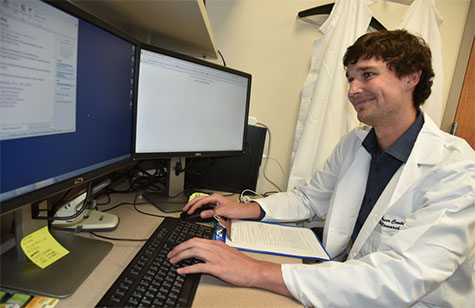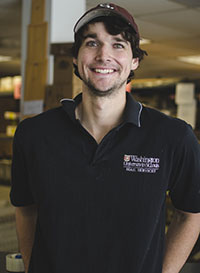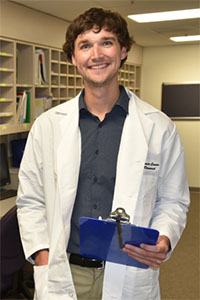
For undergraduates, receiving an email or text message with “You have received a package,” in the subject line can be enough to brighten even the worst case of Monday blues.
Andy Maus was the man behind those messages.
From January 2012 through June of this year, Maus, 27, worked in the South 40 mailroom in Hitzeman Hall on the campus of Washington University in St. Louis, where he received, organized and shelved packages for freshman and sophomore students. He took over the email and text message alert system after about a year, when he said his boss, Peggy Smith, realized he was computer-savvy.
With control over the alert system, Maus could personalize his messages to remind students to bundle up during winter months or let them know he was scanning after hours if they still wanted their packages. His favorite part of the job had nothing to do with the mail or the computers, however.
“After starting, I quickly realized that I saw thousands of people a day at peak times,” Maus said. “It was great! I loved getting to talk to students — it kept me feeling young after I graduated.”
Maus graduated in December 2010 from the University of Missouri, where he earned his bachelor’s degree in biology while playing baritone in the marching band and throwing around a football with his friends on weekends.
Working in the South 40 mailroom wasn’t his first stop after studying his organic chemistry books, however. After graduating from Mizzou, Maus took a job at Monsanto Co. in February 2011 before settling in later that year at the McDonnell Genome Institute, where he said he maintained a genome-sequencing machine.
So how did he go from DNA analysis to weighing packages?
Although Maus was one of the lucky undergraduates to get a job in his field of interest after graduation, recession and budget cuts soon got the best of him. He searched for another biology-related job, but when nothing turned up, he reconsidered his options.
Maus’ father, Gary Maus, contract manager liaison for purchasing services, told him about the open position in the South 40 mailroom. Though it was vastly different from what he had previously done, Maus applied for the job.
“It was either start all over somewhere else, or take a job that wasn’t in my field and keep my benefits,” he said.

In January 2012, Maus officially swapped his lab coat for his mailroom uniform. He remained positive. “I’ve never had a job — and I’ve had some weird jobs — that I didn’t enjoy doing,” he said. “The first job I ever had was pushing carts at Sam’s Club, and I loved it. If I could make a career out of pushing carts, I would do it.”
Although it wasn’t quite Sam’s Club — and nothing like the Genome Institute — Maus ended up loving the South 40 mailroom.
“I was like Santa Claus every day of the year,” he said, ”Everyone loves getting packages.”
Maus gave students more than just care packages from their parents, however. Being only a few years out of college himself, Maus tried to offer as much advice to students as he could.
“No. 1: don’t be so cocky,” he said. “I think coming to WashU is very eye-opening for a lot of students because typically, they were the best and the brightest at their high schools. But now that you’re here, you’re one of 8,000 other kids a lot like you.”
Most of all, though, Maus wanted students to enjoy the time they have here.
“You know, you can study your books, but also try and have some fun, too,” he said. “I always try to harp on that, as much as I don’t think parents would like it. You have to have someone telling you that — it’s much more about the experience than anything else.”
Back to the lab
While Maus enjoyed his time in the mailroom, this June he returned to his undergraduate roots when he was offered a position as a clinical research coordinator at Washington University School of Medicine in St. Louis.
According to Maus, he works under “the man in multiple myeloma,” Ravi Vij, MD, professor of medicine in the Division of Oncology and a medical oncologist with Siteman Cancer Center.
Multiple myeloma is the second-most common blood cancer. Unfortunately, so far it is incurable. Researchers like Vij have been working toward advances in therapy to prolong and improve the quality of patients’ lives.

Vij and his colleagues are overseeing a multitude of different clinical trials for patients with multiple myeloma. After patients are diagnosed with multiple myeloma, they first discuss their options for treatment with Vij before they are referred to Maus.
At this point, Maus enrolls patients in the trials that best fit their needs. He is responsible for ensuring patients complete all of the necessary components to be enrolled in the trials, including getting blood work done and attending appointments. Overall, Maus’ job is to ensure that patients get the best care possible during the investigational study.
“Just like in the mailroom, interacting with people is the best part of the job for me,” he said. “I talk to patients about the general procedure, but the rest of the time I just get to sit and talk with them. They don’t want to just be a patient number; they want to be a person. So that’s how I treat them.”
Maus said he’s thoroughly enjoying the job and leaves work every day feeling positive that he had an impact on someone’s life. But he can still commiserate with students on their pre-med tracks.
“Right now, I feel like I don’t know anything — but that just comes with being new,” he said. “I’ll learn more. I just need to go back to my biology textbooks.”
Incoming freshmen who have yet to receive Maus’ wisdom and upperclassmen who have formed close friendships with the “big brother of the mailroom” shouldn’t get discouraged at Maus’ absence — he might be back to talk about his research in the fall.
“I’m going to miss the students,” he said. “I’m going to miss the job. But I’ll be back in August. After hours, when I get off work at 5, maybe I’ll drive down and scan packages.
“No one else wants to come in after hours. But I’d love to.”